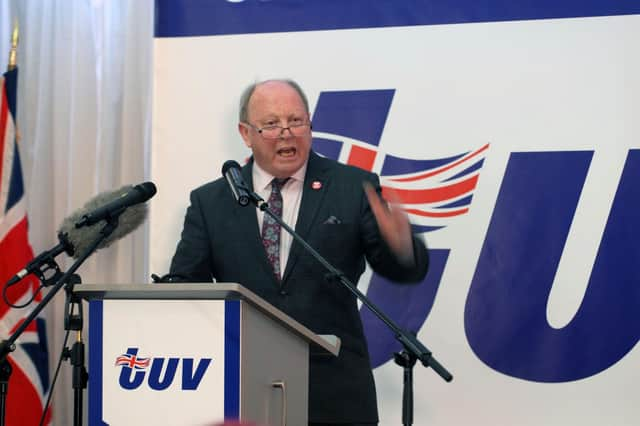Jim Allister says 'privileged access' to EU market comes at the price of an Irish Sea border


Mr Allister said: “When Sir Jeffrey Donaldson says he is seeking ‘privileged access’ for NI to the EU single market for goods, the price of such needs to be fully understood.
“It would be better called ‘submissive access’ or even ‘purchased access’, because it inevitably comes at the price of submitting to EU law, the EU court and its Irish Sea border.
Advertisement
Hide AdAdvertisement
Hide Ad“Annex 2 of the Protocol and its hundreds of EU laws still enforced in NI are testament to the price of access to the EU single market for goods. Subjecting ourselves to laws we don’t make and can’t change seems a strange privilege to me!
“There is no privilege, only prejudice, in an Irish Sea border, subjection to EU law and suspension of Article Six of the Acts of Union.”
Mr Allister has repeatedly called for removal of EU law from Northern Ireland. According to a High Court ruling in a case brought by Mr Allister, Baroness Arlene Foster and other unionist leaders questioning the legality of the Protocol – EU law is one of a number of arrangements which conflict with the Act of Union. Before the NI Protocol, the act in essence put NI on an “equal footing” economically with Great Britain.
However Mr Justice Colton ruled that: “Compliance with certain EU standards; the bureaucracy and associated costs of complying with customs documentation and checks; the payment of tariffs for goods ‘at risk’ and the unfettered access enjoyed by Northern Ireland businesses to the EU internal market conflict with the ‘equal footing’ described in Article Six”. The UK Supreme Court ultimately decided that the Protocol was lawful.
Advertisement
Hide AdAdvertisement
Hide AdThe DUP’s seven tests say any deal must “fulfil Article Six of the Act of Union” and “not constitute a border in the Irish Sea”. The party says its priority is restoring NI’s place in the UK and its internal market – but it also wants to maintain access to the EU’s single market. Sir Jeffrey and his Lagan Valley colleague Emma Little Pengelly MLA – who is likely to be deputy first minister if Stormont is restored – argue that the two markets are not mutually exclusive.
Comment Guidelines
National World encourages reader discussion on our stories. User feedback, insights and back-and-forth exchanges add a rich layer of context to reporting. Please review our Community Guidelines before commenting.